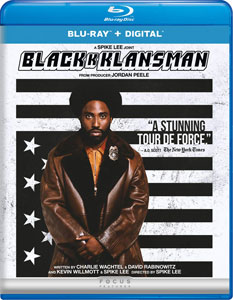“BlacKkKlansman” continues the trend of films based on true stories – along with the likes of “I, Tonya” and “The Disaster Artist” – that would be labeled as illogically plotted if they were fictional. This Spike Lee joint is the story of Ron Stallworth, not the Steelers player but rather a Colorado Springs detective who infiltrated the Ku Klux Klan as an undercover detective in the 1970s, despite being black.
Although this is not the Dave Chappelle skit it seems to be, “BlacKkKlansman” is still quite funny (though not the laugh-out-loud kind) as we soak up the absurdity of the situation. Ron (John David Washington, Denzel’s son) makes the mistake of using his real name when impulsively calling a phone number to join the KKK so he can prove his worth as an undercover officer. White fellow detective Flip (Adam Driver) then has to pose as Ron for the face-to-face meetings, but technically Ron becomes a black Klansman, with a membership card.
As it moves forward, the film skirts the line between humor and the low-grade melancholy of the Klan, which includes a member who “passes” as white but is clearly brown-skinned. Connie (Ashlie Atkinson) wants to play a bigger role, rather than just preparing veggies and dip when her husband Felix (Jasper Pääkkönen) hosts meetings. And Paul Walter Hauser – Shawn Eckhardt in “I, Tonya” — again steals scenes; here he is Ivanhoe, who clearly just wants a group to belong to, but sometimes slips and says something like “(Black people) sure can dance, though.”
Lee and the screenwriters (Charlie Wachtel, David Rabinowitz, Kevin Willmott and Lee himself) nicely illustrate the tragedy that can come from putting your group – white, black or blue – above all else, along with the intellectual dishonesty required to prop up group-think. For instance, Ron’s love interest, Patrice (Laura Harrier), the president of Colorado College’s Black Student Union, believes all cops are bad even though she knows a good one intimately.
Although I don’t doubt that longtime KKK bigwig David Duke (Topher Grace) believes what he says about white genetic superiority, the film positions things so he is giving his stump speech while Ron stands nearby, having been assigned as to his police detail. A viewer gets a sense that Duke couldn’t say these things directly to Ron’s face, because once you know a person, it’s hard to hate or even minimize them based on something superficial. And it’s interesting to wonder what Duke must’ve thought after eventually learning that his good telephone friend Ron is a black man.
Lee does a nice job of blending various tones. Split-screen scenes showing Ron and Duke talking on the phone never cease to be amusing, but “BlacKkKlansman” gradually works its way to a serious final statement. Peppered throughout the film are history lessons, including Patrice’s driving-while-black encounter and Ron being called “toad” by a racist fellow officer.
It’s less personal when a guest speaker for the Black Student Union gives a monologue about an early 20th century tragedy of his mentally challenged friend being brutalized and killed in the street after a wrongful rape conviction. But Lee punctuates the monologue with the students’ gasps, elevating the story from cold factual narrative.

After nailing the landing on many of its threads, notably the ongoing Ron-Duke phone relationship, “BlacKkKlansman” doesn’t necessarily need the closing montage of current events to illustrate that the issues of the 1970s are still going on today. But I found it didn’t jar the movie’s flow too much.
While the film certainly shows black and white people working together (Michael Buscemi’s white Jimmy is on the team with Jewish Flip and black Ron), the broader realities about race relations are never far from the surface. It’s a low-grade funny movie, and it even has some warm and happy moments. But “BlacKkKlansman” ultimately leaves a viewer depressed that 2018 is not a notably more harmonious time than the 1970s.

